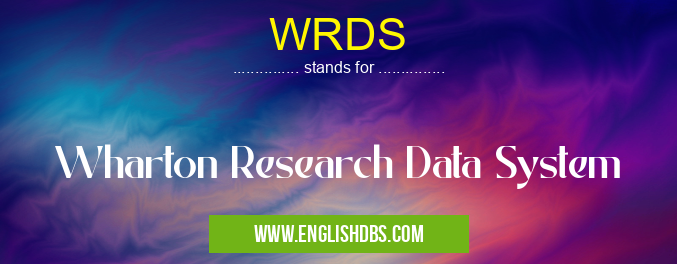What does WRDS mean in RESEARCH
WRDS (Wharton Research Data System) is a comprehensive database and analytical platform for academic research in business and finance. It provides researchers with access to a vast array of data sources, analytical tools, and collaboration features.

WRDS meaning in Research in Academic & Science
WRDS mostly used in an acronym Research in Category Academic & Science that means Wharton Research Data System
Shorthand: WRDS,
Full Form: Wharton Research Data System
For more information of "Wharton Research Data System", see the section below.
What does WRDS Stand for?
WRDS stands for Wharton Research Data System.
Meaning in SCIENCE
WRDS is invaluable for researchers in the fields of business, finance, and economics. It offers a wide range of datasets, including:
- Company data (financial statements, market data, corporate governance)
- Industry data (sector reports, economic indicators, market trends)
- Consumer data (surveys, purchase histories, demographics)
- Macroeconomic data (GDP, inflation, interest rates)
Features of WRDS
WRDS provides a suite of analytical tools to help researchers analyze their data, including:
- Statistical analysis (regression, time series analysis, hypothesis testing)
- Data visualization (charts, graphs, maps)
- Machine learning (classification, prediction, optimization)
Collaboration and Support
WRDS fosters collaboration among researchers through its online community and user forums. It also provides technical support and training to help users maximize their research efficiency.
Essential Questions and Answers on Wharton Research Data System in "SCIENCE»RESEARCH"
What is WRDS?
WRDS (Wharton Research Data Services) is a leading provider of business and financial data, providing access to extensive and reliable datasets for academic research and analysis.
What types of data are available on WRDS?
WRDS offers a broad range of datasets, including company fundamentals, financial statements, market data, economic indicators, and alternative data sources. These datasets cover global companies and markets, spanning various industries and time periods.
Who can access WRDS data?
WRDS data is primarily accessible to academic institutions and researchers affiliated with accredited universities or research organizations.
How do I get started with WRDS?
To access WRDS data, you will need to subscribe through your institution or organization. Once subscribed, you can create an account and log in to the WRDS platform.
Is there a cost associated with using WRDS?
Yes, there is a subscription fee to access WRDS data. The cost varies depending on the type of subscription and usage level.
What are the benefits of using WRDS?
WRDS provides several benefits for research, including:
- Comprehensive and reliable data sources
- Intuitive data retrieval and analysis tools
- Collaboration and data sharing capabilities
- Support and training resources
How can I get help with using WRDS?
WRDS offers extensive documentation, tutorials, and online support. Additionally, users can reach out to the WRDS support team via email or phone for assistance.
Final Words: WRDS is a powerful resource for academic research in business and finance. Its comprehensive data, analytical tools, and collaboration features empower researchers to conduct groundbreaking studies and advance knowledge in their respective fields.
